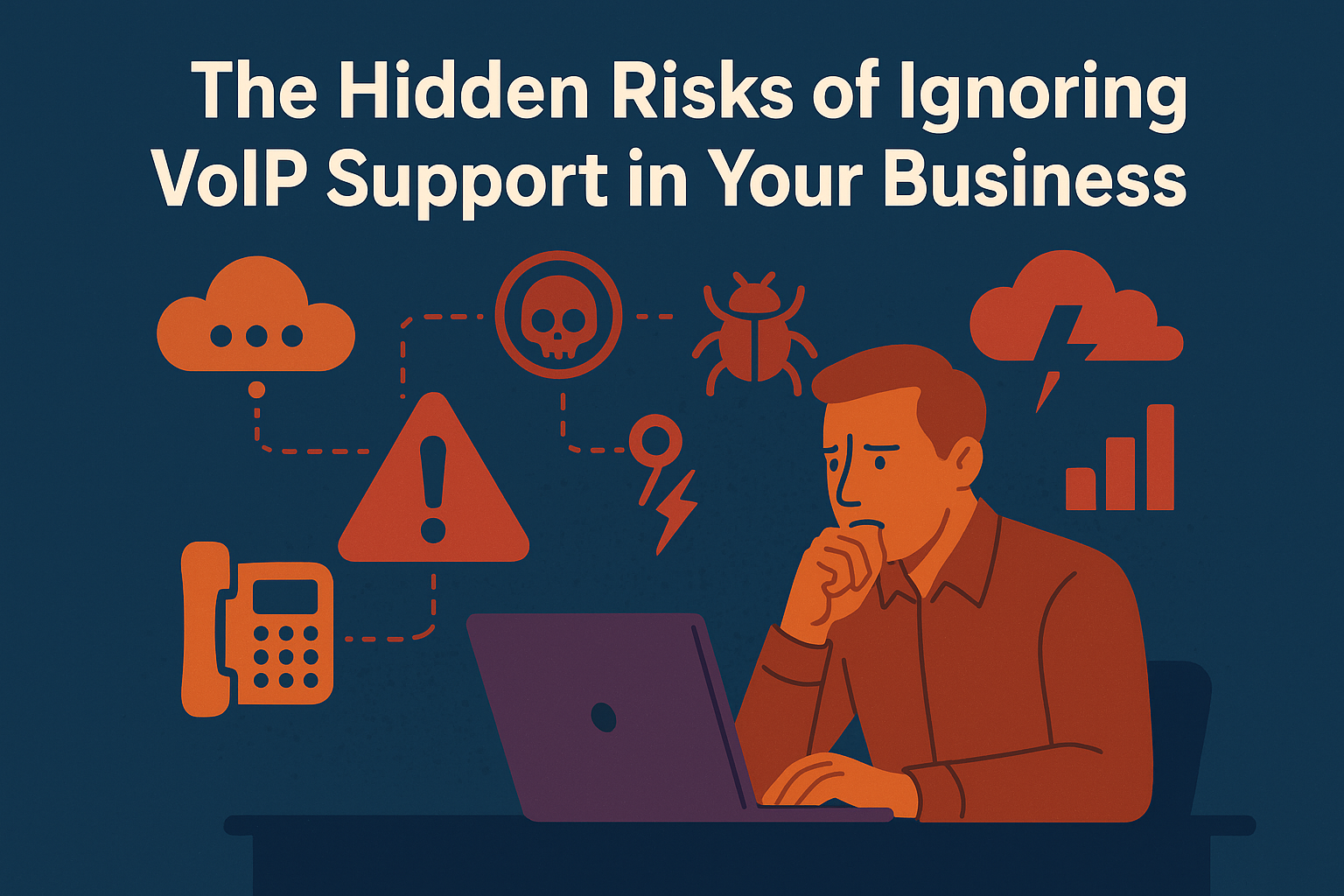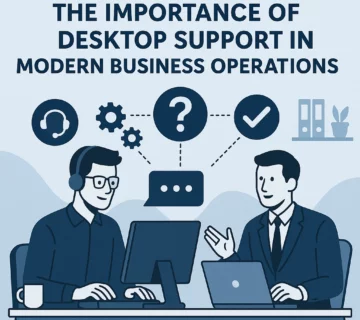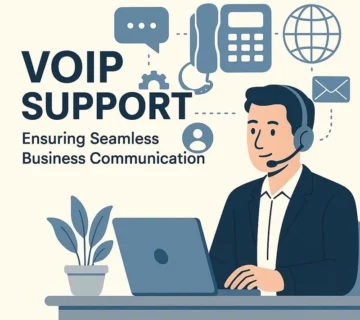The Hidden Risks of Ignoring VoIP Support in Your Business

Voice over Internet Protocol (VoIP) has revolutionized business communications, offering cost-effective solutions that enable companies to connect with customers and colleagues worldwide. However, many businesses make a critical mistake by overlooking the importance of proper VoIP support service, exposing themselves to significant operational and financial risks.
Understanding the Critical Role of VoIP Support
Business VoIP support encompasses the technical assistance, maintenance, and troubleshooting services essential for keeping your voice communication systems running smoothly. Unlike conventional landline systems, VoIP depends primarily on stable internet access and intricate software setups that call for advanced technical knowledge.
What VoIP Support Actually Includes
Professional VoIP support typically covers:
- Network optimization and quality assurance
- Security monitoring and threat prevention
- Software updates and patch management
- Hardware maintenance and replacement
- 24/7 technical assistance and troubleshooting
- Performance monitoring and reporting
The Most Dangerous Risks of Inadequate VoIP Support
1. Communication Blackouts That Paralyze Operations
Without proper support, your VoIP system becomes vulnerable to unexpected failures that can completely shut down business communications. These outages often occur at the worst possible times, leaving your team unable to contact clients, process orders, or coordinate critical operations.
The impact extends beyond inconvenience. A full day of disrupted connectivity can bring about:
- Lost sales opportunities worth thousands of dollars
- Damaged client relationships and trust
- Missed deadlines on time-sensitive projects
- Emergency situations where staff cannot reach help
2. Security Vulnerabilities Open Dangerous Attack Vectors
VoIP systems present attractive targets for cybercriminals because they handle sensitive business conversations and often lack proper security measures. Without dedicated support monitoring your system, hackers can exploit vulnerabilities to:
- Intercept confidential business discussions
- Make unauthorized international calls costing thousands
- Use your system as a launching point for larger network attacks
- Steal customer data shared during phone conversations
3. Poor Call Quality Destroys Professional Image
Inconsistent audio quality, dropped calls, and technical glitches during important conversations can severely damage your business reputation. Clients and partners may question your professionalism and reliability when they experience:
- Constant call interruptions and reconnections
- Echo, static, or distorted audio quality
- Delayed responses due to audio lag
- Inability to reach your business during critical moments
4. Hidden Costs That Drain Your Budget
The absence of proper VoIP support often leads to expensive emergency repairs and inefficient system usage. Businesses frequently discover they’re paying for:
- Unused features and unnecessary bandwidth
- Emergency technical support at premium rates
- Replacement hardware that could have been maintained
- Lost productivity during system downtime
How These Risks Multiply in Different Business Scenarios
Small Businesses Face Disproportionate Impact
Small companies often lack internal IT resources to handle VoIP issues, making them particularly vulnerable. A communication outage during peak sales activity or vital customer support interactions can seriously disrupt revenue and jeopardize long-term loyalty. Many small business VoIP providers offer basic support, but inadequate coverage can still lead to critical failures.
Enterprise Organizations Risk Compliance Violations
Large businesses operating in regulated industries face additional complications when VoIP systems fail. Healthcare organizations, financial institutions, and legal firms may violate compliance requirements if they cannot maintain proper communication records or ensure secure client conversations. This is why enterprise VoIP providers must offer comprehensive security and compliance support features.
Remote Teams Lose Critical Connectivity
Companies with distributed workforces depend entirely on VoIP systems for team coordination and client communication. Support failures can isolate remote workers, disrupting collaborative projects and reducing overall productivity.
Warning Signs Your VoIP Support Is Inadequate
Technical Indicators
Monitor these red flags that suggest your current support arrangement isn’t meeting your needs:
- Frequent system crashes or unexpected reboots
- Increasing frequency of call quality complaints
- Slow response times for technical issues
- Recurring problems that never get permanently resolved
- Outdated software versions with known security vulnerabilities
Business Impact Signals
Pay attention to these operational warning signs:
- Declining customer satisfaction scores related to communication
- Employees avoiding phone calls due to technical problems
- Increased time spent troubleshooting rather than working
- Growing IT support tickets related to phone system issues
Building Robust VoIP Support Infrastructure
Essential Support Components
Comprehensive VoIP support should include:
Proactive Monitoring: Continuous system surveillance that identifies problems before they cause outages or impact call quality.
Rapid Response Protocols: Clear escalation procedures and guaranteed response times for different types of technical issues.
Security Management: Regular security assessments, threat monitoring, and immediate response to potential breaches.
Performance Optimization: Ongoing system tuning to ensure optimal call quality and efficient bandwidth usage.
Choosing the Right Support Partner
When evaluating VoIP support providers, prioritize those offering:
- Industry certifications and proven technical expertise
- 24/7 availability with multiple contact methods
- Transparent service level agreements with measurable goals
- Experience with your specific industry requirements
- Comprehensive reporting and communication about system status
Working with a top business VoIP provider ensures access to advanced support capabilities and enterprise VoIP solutions designed for mission-critical operations.
Internal Team Preparation
Even with external support, your internal team should understand:
- Basic troubleshooting procedures for common issues
- When to escalate problems to professional support
- How to document and report technical problems effectively
- Emergency communication procedures during system outages
Cost-Benefit Analysis of Professional VoIP Support
Investment Considerations
Professional VoIP support typically represents 10-15% of your total communication system costs, but this investment provides substantial returns through:
- Reduced downtime and associated productivity losses
- Lower emergency repair costs and expedited shipping fees
- Improved system efficiency and reduced bandwidth waste
- Enhanced security protection preventing costly breaches
Many businesses discover that partnering with leading VoIP providers who offer comprehensive support packages delivers better value than seeking an affordable VoIP service without adequate technical backing.
Measuring Return on Investment
Track these metrics to quantify the value of proper VoIP support:
- System uptime percentage and improvement trends
- Average resolution time for technical issues
- Employee productivity during communication-dependent tasks
- Customer satisfaction scores related to communication quality
Future-Proofing Your VoIP Investment
Scalability Planning
Proper support ensures your VoIP system can grow with your business needs. This includes:
- Capacity planning for increased call volumes
- Integration capabilities with new business applications
- Migration support for system upgrades and expansions
- Training resources for new employees and features
Successful business VoIP integration requires ongoing support to maintain compatibility with existing systems and accommodate future expansion requirements.
Technology Evolution Adaptation
VoIP technology continues advancing rapidly, and professional support helps you:
- Stay current with security patches and feature updates
- Evaluate and implement beneficial new capabilities
- Maintain compatibility with changing internet infrastructure
- Plan strategic technology roadmaps aligned with business goals
Frequently Asked Questions (FAQs)
What happens if my VoIP system fails during business hours?
Without proper support, VoIP failures during business hours can completely halt communication capabilities. Professional support providers typically offer emergency response within 15-30 minutes, including temporary workarounds while permanent repairs are implemented. They may also provide backup communication methods to ensure business continuity.
How much should I budget for VoIP support services?
Most businesses should allocate 10-15% of their total VoIP system investment for ongoing support services. This typically ranges from $50-200 per user per month, depending on service level requirements, system complexity, and industry compliance needs. The cost is usually offset by prevented downtime and improved system efficiency.
Can I handle VoIP support with my existing IT team?
While basic troubleshooting can be handled internally, VoIP systems require specialized knowledge of voice protocols, network optimization, and telephony security. Most businesses benefit from hybrid approaches where internal teams handle routine maintenance while specialized providers manage complex technical issues and strategic planning.
What are the signs I need to upgrade my VoIP support?
Key indicators include: increasing frequency of technical issues, longer resolution times, recurring problems, outdated system components, growing user complaints about call quality, and security concerns. If your current support provider cannot meet defined service level agreements, it’s time to evaluate alternatives.
How do I evaluate different VoIP support providers?
Compare providers based on: technical certifications and expertise, response time guarantees, availability hours, industry experience, customer references, service level agreements, pricing transparency, and scalability options. Request detailed proposals and speak with current customers about their experiences.
Is 24/7 VoIP support really necessary for my business?
The need for 24/7 support depends on your business operations and customer base. Companies serving global markets, providing emergency services, or operating multiple shifts typically require round-the-clock support. However, even businesses with standard hours benefit from after-hours monitoring that can prevent issues before the next business day.
What should be included in a VoIP support service level agreement?
Essential SLA components include: guaranteed response times for different issue priorities, system uptime commitments, resolution time targets, escalation procedures, reporting requirements, security incident response protocols, and clear definitions of support scope and exclusions.
How can I minimize VoIP support costs without sacrificing quality?
Optimize costs by: implementing proper user training to reduce support tickets, maintaining current system documentation, establishing clear internal troubleshooting procedures, choosing support plans aligned with actual needs rather than maximum coverage, and working with providers offering flexible service options.




No comment